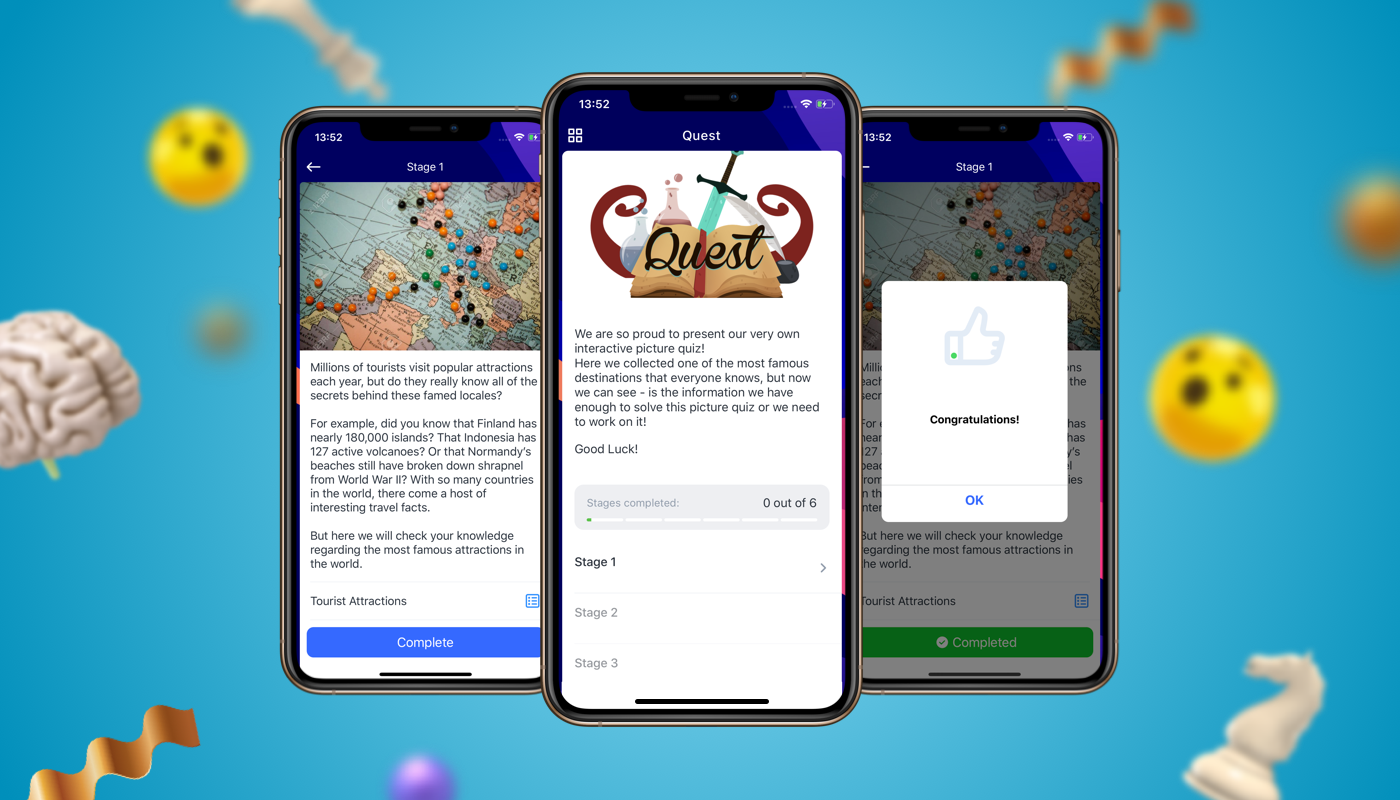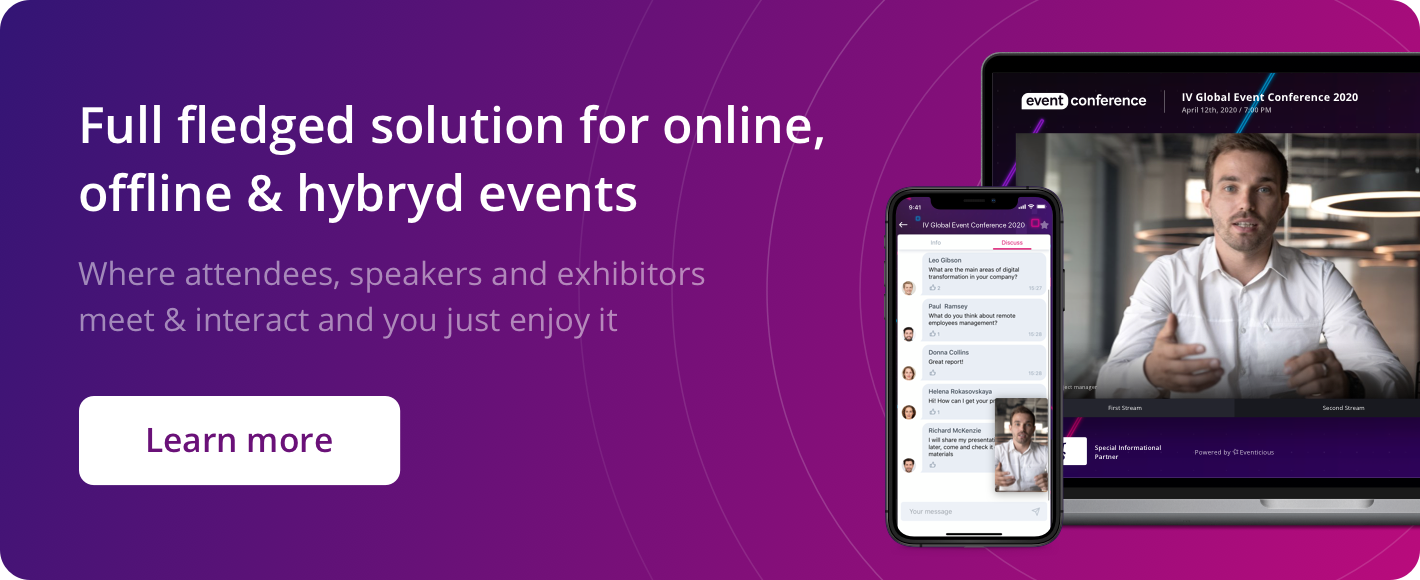The main purpose of our new Quests module is to add some fun and interactivity to your event apps. It doesn’t matter where the event is held, online or offline: game mechanics will add some zing to it and make it more interesting and exciting for participants.
Game mechanics for real-life events
Mobile event apps built on the Eventicious platform have a lot more to offer to live-event participants than just a digital version of paper handouts.
A tour of the event venue
An in-app quest will help attendees familiarize themselves with the event venue in an entertaining format. Use it for an original presentation of a new hotel complex, or for an interactive tour of festival zones.
Let participants navigate the suggested route, step by step, finding clues and solving riddles, immersing themselves into the event atmosphere and exploring the site at the same time.
Check-ins at partner stands
An in-app quest is a terrific sponsor activation tool. Offer a prize to those attendees who check-in at all partner booths.
The mechanics can be as follows: place stickers with codes on participating stands. Attendees must guess a partner company by its description, locate the right code on its stand, and enter it in the app to complete the step. For each completed part of the quest, participants are rewarded with bonus points, which can be exchanged for branded merchandise or prizes from sponsors.
Team building and team contests
In-app quests are also a great tool for team building and team contests. Any scenario that requires teams to complete a series of tasks to secure victory will only benefit from digital technology. Tasks and hints are posted in the app, but in order to complete a step and submit a correct answer, teams must perform some real-life actions.
In this case, the app can be installed on each participant’s smartphone or on a tablet handed over to each team.
Networking games
Our ‘Quests’ module can also be used for ice breaking games. A participant launches the game and is presented with a list of tasks. Each task requires finding an attendee who matches the provided description, getting a code word from them, and entering it into the corresponding field in the app.
When all tasks have been completed, the game is considered over, and participants receive bonus points or gifts from organizers. To make sure that everyone is in the game and the players don’t get stuck, organizers will need to offer several quest options and make sure that there is more than one attendee matching each description.
Challenges
This is how it works: tasks – individual or team challenges – appear in the app, for example, “Go for a morning run”, “Make a creative video about your team”, “Go to a store, talk to customers who buy company’s products, and record it on video”. Such challenges mobilize attendees, put them in a productive mood and boost their self-confidence.
Game mechanics for virtual events
Online events can benefit from game mechanics even more than offline ones. After all, game elements are what makes an offline event different from a ZOOM work call and keeps attendees engaged and entertained.
Engagement and motivation
Game mechanics help to keep virtual event attendees alert and engaged. It’s hard to remain focused when you are just a passive observer, but what if you can win a contest and receive a prize? This will certainly boost your motivation.
Quests that will engage online attendees can include tasks that require keeping an eye on the live stream. For example, half way through the broadcast, a secret code word will suddenly appear on the screen, and participants must notice it and enter it into the corresponding field to complete a step of the quest. Here are some other examples of tasks: “visit our partner’s website and find the correct answer to this question”, “post a certain photo to the general chart”, “answer a few questions on the subject of this presentation”, and so on.
Type matching and sponsor integrations
Another example of engaging mechanics at online events is when attendees are asked to take a test to determine what type they belong to. Depending on the results of this test, participants can, for example, receive special offers from partners, or recommendations. Such tests can be offered to brands as a sponsor integration and a way to discreetly promote company’s products or collect warm leads.
Themed quests as an extracurricular activity
An educational and entertaining themed quest can be a great supplement to the useful content of an online industry conference. For example, “Hunt the best candidate” -- a quest for HR managers, or “Sell the elephant” -- a quest for sales professionals.
Quests in virtual rooms
An in-app quest is a good technical solution for online team building. Participants virtually move from one ZOOM room to another, and each time they are greeted by a host and presented with a mystery they need to solve. When participants come up with an answer, they enter it in the app and receive a ‘key’ to the next virtual room with more riddles.
Battle of minds
An in-app quest is a perfect tool for brain teasing games played in teams, in the format of “Million Dollar Mind Game”. Each step of the quest is a logic riddle that can be illustrated with an image or a video. The first correct answer earns points for the team.



